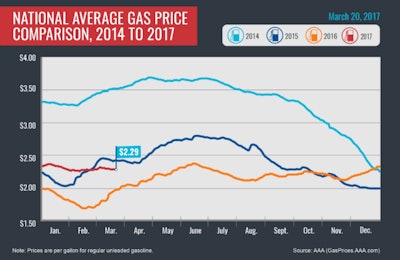 Today’s drivers are paying 31 cents more per gallon compared to last year.
Today’s drivers are paying 31 cents more per gallon compared to last year.Photo: AAA
Right now, it seems that gasoline prices are stable for the most part, with the national average price of regular unleaded gasoline holding at $2.29 per gallon according to the American Automobile Association (AAA).
Compared to one week ago, the average price is down by fractions of a penny. Compared to last month, it has only moved one cent higher. Looking at this date last year, drivers are paying 31 cents more per gallon at the pump.
The nation’s top ten least expensive markets are: South Carolina ($2.01), Tennessee ($2.04), Alabama ($2.05), Mississippi ($2.06), Arkansas ($2.08), Texas ($2.09), Virginia ($2.09), Oklahoma ($2.09), Louisiana ($2.10) and Missouri ($2.10).
Whereas the markets that have seen the largest yearly increases are: Washington (+61 cents), Utah (+60 cents), Alaska (+58 cents), Idaho (+56 cents), New Jersey (+55 cents), Oregon (+54 cents), Hawaii (+51 cents), Montana (+44 cents), Pennsylvania (+43 cents) and Connecticut (+40 cents).
While prices have not fluctuated much over the past few months, speculations continue about the balance between the Organization of the Petroleum Exporting Countries’ (OPEC) cuts and U.S. production driving the market.
Along the West Coast, gas prices remain high, while in the Rockies they have remained stable with the only movement being just within fractions of a penny.
In the Great Lakes and Central states, prices continue to bounce back and forth with some states seeing double-digit declines at the beginning of the month, only to see it rise over the past seven days.
Last week as refiners prepared to make the switch from winter-blend to summer-blend gas, the East Coast saw a decline in supplies; prices remained stable overall, however. The South and Southeast markets continue to show some of the lowest prices for retail gas in the nation.










